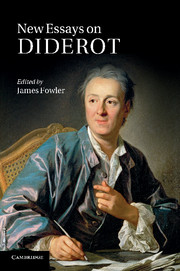Book contents
- Frontmatter
- Contents
- Notes on contributors
- Acknowledgements
- List of abbreviations
- Introduction
- PART I DIDEROT THE PHILOSOPHE
- PART II NOVELS
- PART III DIALOGUES
- PART IV PLAYS AND DRAMATIC THEORY
- PART V MUSIC, PERFORMANCE, AESTHETICS
- 14 Diderot's voice(s): music and reform, from the Querelle des Bouffons to Le Neveu de Rameau
- 15 Diderot and the aesthetics of the libretto
- 16 Ekphrasis and related issues in Diderot's Salons
- Select bibliography
- Index
15 - Diderot and the aesthetics of the libretto
Published online by Cambridge University Press: 11 April 2011
- Frontmatter
- Contents
- Notes on contributors
- Acknowledgements
- List of abbreviations
- Introduction
- PART I DIDEROT THE PHILOSOPHE
- PART II NOVELS
- PART III DIALOGUES
- PART IV PLAYS AND DRAMATIC THEORY
- PART V MUSIC, PERFORMANCE, AESTHETICS
- 14 Diderot's voice(s): music and reform, from the Querelle des Bouffons to Le Neveu de Rameau
- 15 Diderot and the aesthetics of the libretto
- 16 Ekphrasis and related issues in Diderot's Salons
- Select bibliography
- Index
Summary
In his Essai sur l'opéra (Essay on Opera), translated into French by Chastellux, Algarotti undertakes to defend the librettist, or ‘rendre surtout au poète, les droits dont il a été dépouillé très injustement’ (‘above all give back to the poet the rights of which he has been most unjustly robbed’). Therefore he will expand on the key importance of the librettist, whose task goes beyond writing a text to serve as a ‘pretext’ for the music: ‘le poète doit diriger les acteurs, les danseurs, les peintres, les machinistes. Il doit concevoir dans sa tête l'ensemble du drame … Il doit, en un mot, être l'âme du spectacle.’ (‘The poet must direct the actors, the dancers, the painters of the decor, the stagehands. He must keep in mind the whole of the dramatic performance … he must, in a word, be the soul of the spectacle.’) This apologia is to be understood in the context of criticisms aimed at libretti throughout the eighteenth century; and Diderot became involved in this protracted debate. We should also remember that the librettist performed some of the functions that would later be assumed by the theatrical director (a role that did not exist in Diderot's time). So we must keep this context in mind if we are to understand the importance, and the occasional bitterness, of the disputes surrounding libretti – disputes that primarily involved Enlightenment authors, many of whom were also librettists.
- Type
- Chapter
- Information
- New Essays on Diderot , pp. 220 - 233Publisher: Cambridge University PressPrint publication year: 2011

